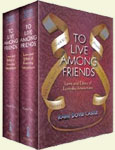Rabbinic guidance for all Inner Torah programs is provided by Rabbi Dovid Castle. Rabbi Castle has spent his life learning Torah, teaching Torah, heading various Torah educational institutions, advocating and resolving disputes according to Torah law, writing seforim in both Hebrew and English, and counseling couples and individuals. The inclusion of his Torah insights in the third book of the Inner Torah series, The Breath and Body of Inner Torah, took that work to a new level adding tremendously to its depth and scope.

One of the English books Rabbi Castle authored has an important place in Inner Torah. Called To Live Among Friends: Laws and Ethics of Everyday Interactions (Feldheim Publishers) it explains in enough detail to be practically applicable, just what the Torah is asking of us in our interpersonal relationships and in our relationship with ourselves. This is the starting point for Torah-observant Jews. From there, we need to be willing to look honestly at ourselves, see where we stand in relationship to whatever Torah requires, and be able to walk ourselves from wherever we are to wherever the Torah is asking us to be. To Live Among Friends helps us identify our destination; Inner Torah helps us reach it.
The Torah directs our actions according to the needs of our souls. That includes much of what we do in our relationships with others and with ourselves. One of the ways we strengthen our adult selves and better enable them to heal and guide our younger, vulnerable selves is to become educated about what the Torah actually requires in any given situation. Too often, we don’t understand just what that is and we unknowingly underestimate or overestimate what is asked of us – and then act, and view ourselves, accordingly.
Remembering, as Inner Torah constantly reminds us, that we are making the journey through this world for the benefit of our souls, we need ways to learn from deep inside Torah sources, what only G-d can know and make known to us. Rabbi Castle brings the wisdom of these eternal sources to us, and helps us apply it to the challenges of our everyday lives. He is available to answer questions from Inner Torah students, clients, and readers on halacha, hashkafa, and other aspects of Torah.








